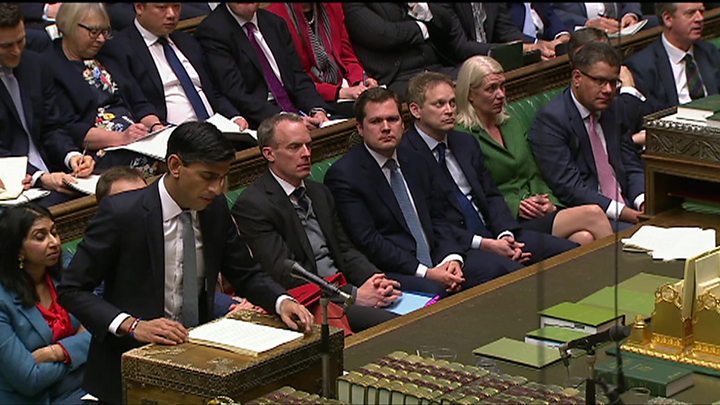Image copyright
Getty Images
Tens of thousands of England’s retail, leisure and hospitality firms will not pay any business rates in the coming year, the chancellor has announced.
Companies with a rateable value of less than £51,000 will be eligible for the tax holiday, Rishi Sunak said.
The measure applies to firms including shops, cinemas, restaurants and hotels.
It is part of a package of “extraordinary” measures to support the UK economy in the face of disruption from the coronavirus outbreak.
“That is a tax cut worth over £1bn, saving each business up to £25,000,” Mr Sunak said.
Business rates are a tax on properties that are used for commercial purposes, and are charged based on an estimate of what it would cost to rent the property on the open market: the “rateable value”.
Mr Sunak described the business rates holiday as an “exceptional step” that would benefit museums, art galleries, theatres, caravan parks, gyms, small hotels, sports clubs and night clubs, all of whom will be hard hit if customers stay away to slow the spread of coronavirus.

Media playback is unsupported on your device
The chancellor said the business rates system as a whole would be reviewed, with the conclusions published in the autumn. Firms in England have campaigned for several years for the system to be reformed, arguing it makes it hard for bricks and mortar retailers to compete with online rivals.
Business rates in Scotland, Wales and Northern Ireland are set by the devolved administrations.
More on Budget 2020
The head of retail and consumer at Pinsent Masons, Tom Leman, said the announcement would be “extremely welcome news” for small businesses.
“On the basis the coronavirus is not a long-term issue for these businesses, it is crucial that they have the liquidity to see them through the worst.
“This will definitely help the cause and hopefully see many of them come out the other side ready to benefit from the increased spending power prompted by the money people are currently saving on their discretionary spend.”
However, some small businesses said the move would not help them. Biju Bubble Tea, based in Soho in London, tweeted that it was suffering the impact of fears around the virus, but would not qualify for relief.
Larger retail and leisure chains are unlikely to benefit from the rates holiday. State aid rules include a cap on the amount of tax relief a business can claim over three years. Most large firms will have already reached the limit as a result of rates relief provided in previous years.
Other Budget measures to support small businesses included:
- Cash grants of £3,000 to very small businesses with rateable values below £15,000
- Government backing for banks to offer loans of up to £1.2m to small and medium-sized businesses
- Businesses with fewer than 250 employees can reclaim the cost of providing Statutory Sick Pay to employees off work due to the coronavirus
As expected, Mr Sunak scrapped a planned cut to corporation tax. The rate of the tax will remain at 19% rather than falling to 17%.
Another change that was widely anticipated was a cut to Entrepreneurs’ Tax Relief. Business owners who sell their firms on were entitled to tax relief on profits of up to £10m over their lifetime. The tax relief has been scaled back rather than abolished, with the lifetime limit reduced to £1m.
The moves to support small businesses would be widely welcomed, analysts said, but larger businesses would feel left out in the cold.
“There is nothing in the Budget that tackles the issues of the larger businesses – and these are the ones shedding the jobs,” said John Webber of property firm Colliers. “We are now destined to see more shop closures and job losses in the High Street in the months ahead.”
Jerry Schurder, at real estate advisors Gerald Eve, said larger retailers and small firms outside the retail and leisure sectors would still face “huge challenges” from the coronavirus outbreak but were “being left to rot by the Treasury”.
